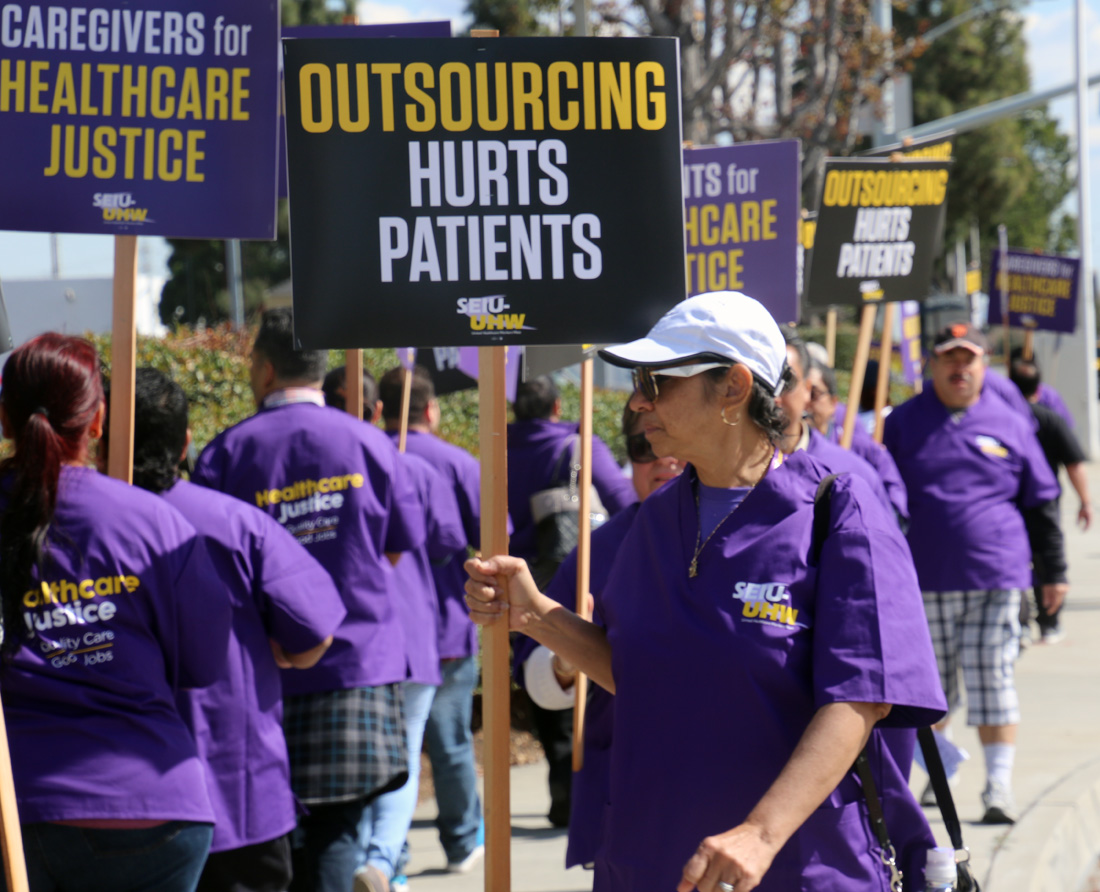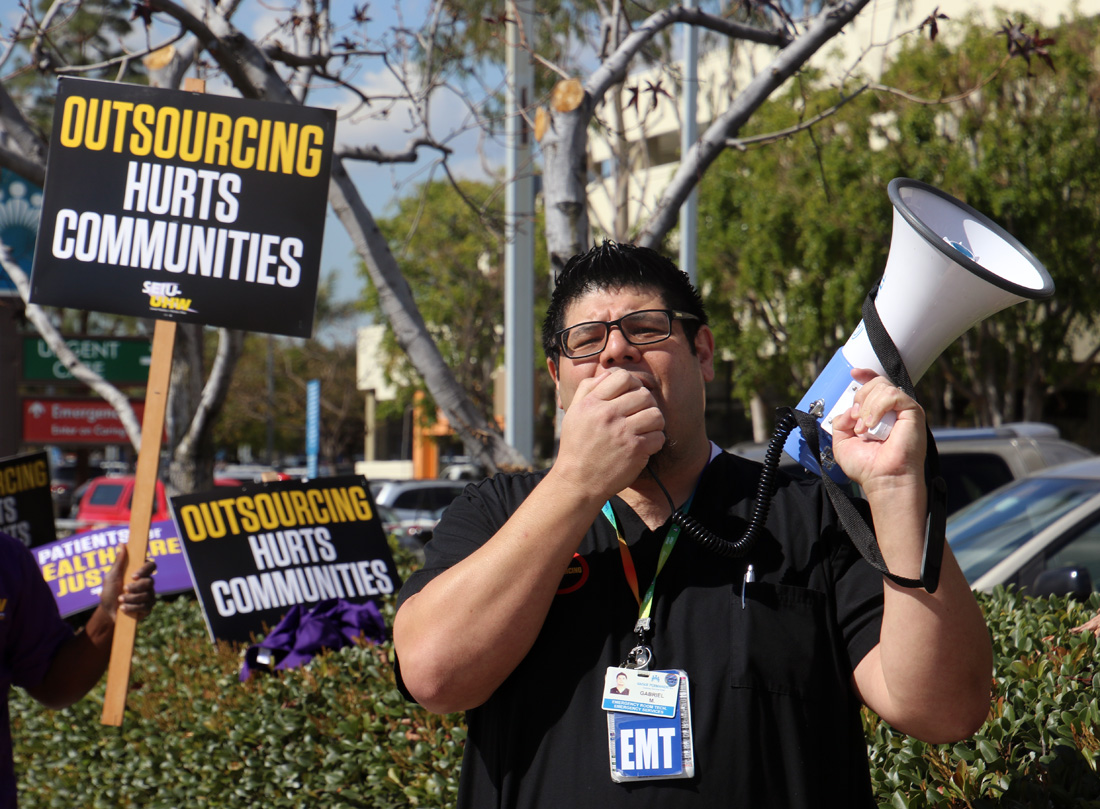Kaiser faces backlash from workers over job outsourcing
Photos by Alex Dominguez
DOWNEY - Kaiser Permanente Downey saw individuals march in protest of the hospital’s planned future outsourcing of 61 jobs.
Clad in purple shirts and their usual workday scrubs, several of the hospital’s workers marched up and down Imperial Highway with protest signs bearing the words “Outsourcing hurts patients,” and “Caregivers / patients for healthcare justice,” each chanting “Healthcare justice!”
This protest was one of 32 held across California by caregivers between Feb. 14 and March 15 at facilities owned by Kaiser.
It was expected by picketors that at least 400 individuals including workers and possibly patients would take part in the protest, which spanned from 11 a.m. to 2 p.m. Wednesday.
Gabriel Montoya, a 38-year-old emergency room assistant who lives in Whittier, says that the outsourcing of these jobs will have a drastic negative effect on patient care.
“What that does is it breeds inexperience; it breeds people who don’t have commitment to Kaiser like our workers do,” said Montoya. “Many of our workers [have worked here] 25 years plus, and that experience leads to good patient care, quality patient care, and people who know their patients.”
Montoya has worked at Kaiser for 10 years. He says that Kaiser has been outsourcing at their other locations for around the last five years or more, which has confused workers due to Kaiser having been profitable in the last several years.
Gabriel Montoya leads a chant during Wednesday's protest.
“That’s the part that’s complexing to us,” said Montoya. “Kaiser last year, they made $4 billion in profits; that’s four billion with a “B.” They have $32 billion sitting in cash on hand, so it is perplexing. How in the heck are you going to sit on that type of money, and yet outsource jobs to non-union workers, and most importantly put your patient care at risk.
“You can’t on one hand if you’re Kaiser say you’re committed to the community you serve, while putting patient care at risk and taking away those middle-class jobs from the community that you serve.”
Montoya says that the entire union of 55,000 workers across the state - 2,500 working at the Downey medical center – are affected.
“Any time you pick on one member of the union, you pick on all of us,” said Montoya. “They’re really working to take away the union’s ability to fight for patient care, and the union’s ability to fight for its members and middle-class jobs.”
Francisco Mora Paez has worked in the warehouse across the street for 11 years as a drug distributor. He says that the outsourcing will not only have drastic effects on patient care, but on the workers home lives as well.
“My job security is out the window,” said Paez. “I pay child-support. I pay medical for my children. This helps pay for their daycare, this helps pay for their medical. Not only that, my bills at home. I’m going to have to restructure everything that’s going on in my life in the context of my children and family at this point.”
Paez added that there has been no set date given to them for when this action will take effect. In the meantime, Kaiser had offered to pay workers affected by the outsourcing for a year, as well as offer educational programs while they look for new work either inside or outside of the hospital.
Still, Paez says that this will still be a blow to workers.
“We want to be where we’re at; we want our job. We don’t want to give it to nobody else,” said Paez. “There’s a lot of employees that work in our warehouse that have family and children, and they’re probably going to have to take pay cuts if they’re going to stay within Kaiser; they’re going to have to take pay cuts anywhere else to go outside of Kaiser.
“I’m hoping that something can get worked out here and they can do the right thing for us because we’ve dedicated a lot of time to Kaiser. I’m hoping they do the right thing and keep us going here.”
In response to the event today, Kaiser released a statement, saying,
"First and foremost, please know that SEIU-UHW is planning to stage a series of rolling informational pickets, not strikes. These informational pickets will not impact our care delivery or operations. Also note that the union has a contract in place and Kaiser Permanente and SEIU-UHW are not in contract bargaining. We have not announced or made any wage proposals for SEIU-UHW members. We are committed to providing our employees excellent wages and benefits wherever they work.
The union’s claims that we have announced 700 layoffs at our call centers is simply not true. Kaiser Permanente has seven appointment service call centers in our Southern California region. These are part of our efforts to provide high quality, affordable and convenient care to our members. To do this consistently and reliably, we must ensure we have the latest technology and work processes. So for example, over the next year we are looking to advancements for appointment booking that will improve our call center agents’ ability to manage member calls and schedule appointments across Southern California. We will certainly make additional improvements and changes in the future, and we will communicate them as we always do: transparently and thoughtfully.
We have been working for more than 8 months with the unions representing our employees who work within our pharmacy warehouses, on how to address the many regulatory, technological and efficiency challenges we face now and in the future. After these careful deliberations and extensive discussions with our unions, including SEIU-UHW (including 17 all-day sessions over the past 8 months), Kaiser Permanente reached the conclusion that an external pharmacy storage and distribution network is the best option for meeting the current and future needs of our members. The exact number of positions affected by this decision has not yet been determined, so the union’s claims are premature and may in fact be wrong. We will be scheduling more sessions with our union partners over the next few months to fully address the effects of this decision. As we determine the potential impact to employees, plans will be finalized and shared with them.
SEIU-UHW’s decision to stage picketing and make misleading and inaccurate statements about Kaiser Permanente is uncalled for and counterproductive. If the union’s leadership is truly interested in working constructively and as a partner, as they claim, they should reconsider this path.
While this union is staging picketing, the physicians and employees of Kaiser Permanente will remain focused on the important work of delivering high-quality, affordable care to our members and improving the health of the communities we serve.
It’s hopefully also helpful to understand the context around why the union’s actions are counterproductive: When bargaining with a union in the Coalition of Kaiser Permanente Unions, for the past 20 years we have jointly used an interest-based problem-solving approach. Unlike traditional bargaining, in interest-based bargaining the parties identify shared interests, propose ways to meet those interests, and agree on solutions. This process yields mutually beneficial results that preserve—and improve—workplace relationships and partnership.
Over the 20 years we have used this approach, we have enjoyed a historically productive labor management partnership that has resulted in improved quality and efficiency, and better working relationships, and has helped Kaiser Permanente improve as a great place to work and to receive care."
Jessica Renteria contributed to this article.




